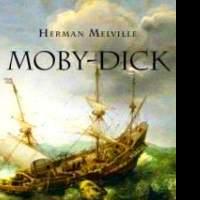CHAPTER THREE Captain Ahab
CHAPTER THREE
Captain Ahab
The Pequod was scheduled to sail on Christmas Day, and there was a lot of work to do before. We were getting ready for a three-year voyage. There were supplies to load - beef, bread, and water - sails to mend and decks to clean.
Ships like the Pequod were not owned by one rich man or by the captain. They were owned by whole towns - by old sailors, widows, reverends, shopkeepers, schoolteachers - each person owned a small part of the ship. So when a ship like the Pequod went off to sea, the voyage had to be a success because the livelihood of many people depended on it.
During these days Queequeg and I often visited the ship, and I always asked about Captain Ahab. But I never saw him. Starbuck, the first mate, said he was ill, but he was slowly getting better.
We sailed from Nantucket on a cold Christmas morning, and I had still not seen the mysterious Captain Ahab. The longer he stayed in his cabin and remained invisible, the greater our surprise and curiosity. We heard him, though. At night as we were swinging in our hammocks trying to sleep, we could hear Captain Ahab walking up and down on the deck above us. He made a strange sound when he walked because he had a peg leg.
One night I heard Starbuck say, "Why don't you rest, Captain? My men can't sleep with the noise of your peg leg. " Ahab's answer was loud and clear, "Why should they sleep? Do I sleep? The sound of my leg will make them dream about whales. " I didn't know what to think, but the words of the crazy old man Elijah kept coming back to me. Starbuck was a Quaker from Nantucket, and a good, honest man. He was tall and quite thin, but very strong. If you looked into his eyes, you could see all the dangers he had faced in his life at sea. He was a quiet individual who faced dangers calmly, and he was patient and understanding with his men.
"I won't have a man on my ship who isn't afraid of a whale," he often said.
He knew what enormous damage a whale could do. He didn't want heroes on the Pequod - he only wanted good men who were aware of their opponent's strength. He knew from experience that a fearless man was more dangerous than a coward.
Stubb, the second mate, was a cheerful man from Cape Cod, who laughed at everything. Even while chasing a whale, he remained calm and relaxed. His pipe was never far from his lips and he kept a dozen of them near his hammock.
Flask, a short, robust young man from Martha's Vineyard, was the third mate. For him whale hunting was a big joke, and the whale was just like an enormous water rat. Flask had fun chasing whales around the world.
Starbuck, Stubb and Flask were much more than just mates on the Pequod. If Ahab had been a mediaeval king, they would have been his knights, and the harpooners would have been his squires.
Each mate commanded his own whale boat with sailors when he went out to chase the great whales. And each mate could choose his own harpooner. Starbuck chose Queequeg as his personal harpooner.
Tashtego, a strong, muscular American Indian from Martha's Vineyard, was Stubb's chosen harpooner. He had long, black, shiny hair and came from a tribe of great hunters. He had replaced his bow and arrow with a harpoon.
The third harpooner was called Daggoo, a gigantic black man, who wore a huge gold earring in each ear. His physical power was impressive.
The other members of the crew came from all over the world - from the Azores, Greenland, the Shetland Islands and Wales.
And so we set off on Christmas morning, thinking about what would happen during this long, three-year voyage. I was proud to be on the Pequod with these brave whalers and happy to be learning this honorable profession.
Several days passed as we sailed through the icy, dark waters of the North Atlantic. But we had not seen Captain Ahab yet; he remained in his cabin.
Then one morning I looked up at the deck and there he was. Captain Ahab, at last! His tall, strong body looked like it was made of bronze. He was all dressed in black except for his white peg leg - a grim figure. His face, wrinkled after years of sun, wind and sea water, was long and without expression. It was ruined too by a long scar that ran from his forehead, down his cheek and neck, and disappeared under his collar. Did the scar go all the way to his feet? There were rumors that the scar had been made during a battle at sea. I learned that the ship's carpenter had made the peg leg from the bone of a sperm whale.
Ahab placed his peg leg in a special hole on the quarterdeck. This kept him balanced when the ship was in rough waters. In spite of his peg leg, Captain Ahab stood straight and looked ahead. His face showed immense pain.
He spoke to no one and no one spoke to him. After standing for a while on the deck he went back to his cabin. As the weather got better, and the ice and icebergs were behind us, we saw more and more of our captain. When we started sailing in tropical waters, the hard, icy expression on his face seemed to melt.

